multivitamin support
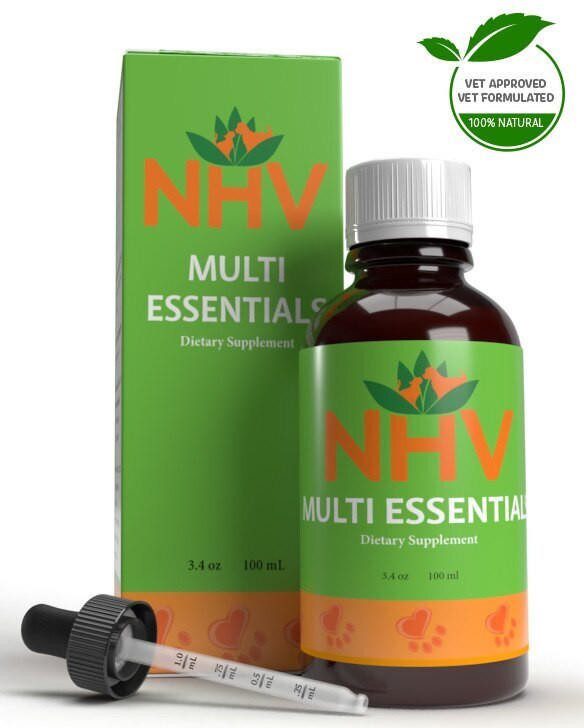
free shipping over $100 (USA & Canada)
1-877-937-4372 the pet expert hotline
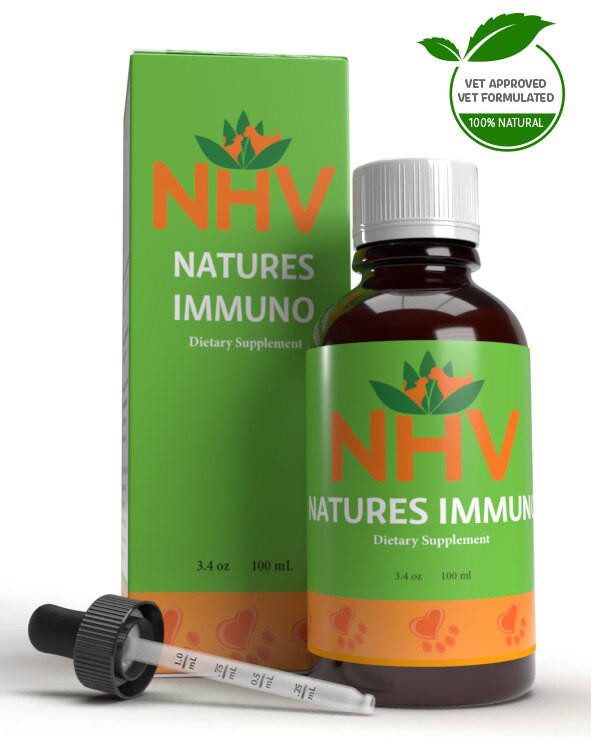
Vet-Formulated Supplement of Medicinal Mushrooms for Dogs


We often see pet parents looking for an immune booster for dogs, and it’s about time we explain why that’s not a good idea. Supporting your little one’s immune system is, in fact, crucial to help them live a healthier, happier, and longer life. Still, an overactive immunity can be just as dangerous as a weakened one. So the key is in finding immunity balance!
Becoming an immunologist takes nine to ten years of education beyond a bachelor’s degree, more time than most veterinary specialties.
Your little one’s immune system is the most complex part of their body outside the brain. It’s an absurdly intricate network of cells and molecules that protect our furkiddos from dangerous agents they are constantly in contact with.
Our pets can be exposed to household chemicals, allergens, viruses, bacteria, vector-carrying insects, and many other elements that can be dangerous to them. The immune system works to identify, destroy and eliminate any of these hazardous pathogens that enter your little one’s body.
Your pup’s immune system has many interconnected parts that work together, such as white blood cells, antibodies, bone marrow, the spleen, the thymus, the lymphatic system, etc. These cells and organs work together in different phases of your little one’s life to offer three different types of immunity – innate, adaptive, and passive:
When pet parents talk about an immune booster for dogs, they are looking for something to help promote their little one’s adaptive immunity.

A treatment, supplement, or medication that would work as an immune booster for dogs could lead to an overactive immune system. An autoimmune disease is exactly that, and it can lead to the accidental destruction of good cells and affect otherwise healthy organs. Many autoimmune diseases and conditions are related to an immune system working overtime, for example, allergies, lupus, Addison’s disease, myasthenia gravis, and type 1 diabetes.
Lethargy, lack of appetite, skin infections, and poor growth are common signs of an underactive immune system.
When your furkiddo’s immune system is weak, on the other hand, the body cannot fight off viruses, bacteria, and other pathogens very well. A weakened immunity can cause your little one to be more prone to recurrent infections. It is also common to see dogs fail to respond to conventional antibiotic therapies if they have a weak immune system.
Many diseases and conditions are related to decreased immunity, like certain tumors such as lymphoma and myeloma or viral infections such as canine distemper and parvovirus. Lethargy, lack of appetite (anorexia), skin infections, and poor growth (hallmark) are common signs of an underactive immune system.
Natural herbal supplements can offer your little one’s body support so that their immune system works as it should. So we are not boosting the immune system, leading to a possible overactive immune response, but balancing their immunity.
NHV Natures Immuno is our main recommendation for overall immunity support. This blend of five medicinal mushrooms has anti-tumoral and anti-viral properties. Thus, if your little one is fighting cancer or a viral disease, Natures Immuno can help balance the immune system.
NHV PetOmega 3 and NHV Turmeric have anti-inflammatory properties that are helpful for elderly pets suffering from arthritis or even for pets with renal or cardiac disease. Both are also helpful in balancing your pet’s immunity.
Lastly, NHV Multi Essentials is a plant-based multi-vitamin herbal extract that helps fill nutritional voids, aids digestion, and enhances nutrient absorption. Multi Essentials also help stimulate metabolism, reduce fatigue, increase energy, and promote healthy skin and coat. This supplement is indicated for all stages of life, including puppies.
In my clinical view, offering extra immune support during all stages of your furkiddo’s life is essential. A puppy should receive the colostrum from their mom as they breastfeed. There is evidence that breast milk may increase the effectiveness of some vaccinations, improve the immune response against certain viruses, support gut microflora, improve bone and muscle function, etc.
The next step is ensuring your little one receives all vaccines recommended by your vet. Some core vaccination will vary depending on your area, as some diseases are more present in certain regions than others.
An age-appropriate diet that takes into consideration your pet’s health condition and breed is also important. It will help offer all the nutrients your dog’s body needs to support their immune system.
The immune system will need extra support if your pet has a health condition. For example, Pups fighting cancer, renal disease, and diabetes could really use immunity support. Lastly, senior dogs should also receive extra immune support, especially those with arthritis and other health concerns.
We hope that you discuss your little one’s needs with a trusted vet the next time you think of getting an immune booster for dogs. At NHV, we have a team of veterinarians and pet experts that can help you choose the best supplements to help balance your little one’s immunity or anything else. Reach out to us anytime, and we can answer all your questions!
multivitamin support

Herbal Digestive Aid, Energy Booster, and Multivitamin for Dogs
buy 2 and save $3
3 month supply for a small to medium size pet
NHV’s multivitamins for dogs targets the brain, stomach, major arteries, kidneys, and liver with a powerful blend of herbal support.

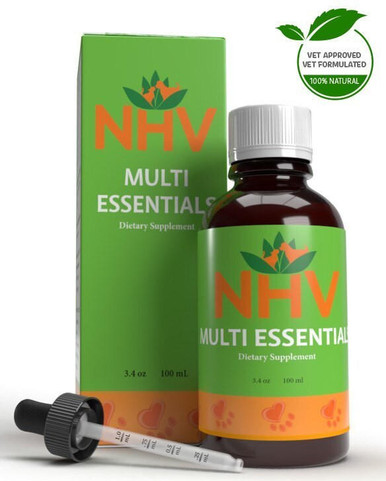
NHV’s multivitamins for dogs targets the brain, stomach, major arteries, kidneys, and liver with a powerful blend of herbal support.

Millions of people take multivitamins daily to support their health, and it only makes sense our canine companions can benefit just as much. This 100% natural plant-based liquid blend can help your dog with nutritional deficiencies.
Signs of Possible Vitamin Deficiency in Dogs
NHV’s Multi-Essentials are packed with herbs that are rich in vitamins and minerals. This vet-formulated blend is designed to benefit your dog’s health using all-natural organically grown herbs with no additives or preservatives.
Even if your pet is healthy, supplying a multivitamin is essential to maintain good health, and some pets need more vitamins and minerals than others. For more, read NHV’s blog, vet talk with Dr. Hillary Cook.
Benefits of NHV’s Multivitamins for Dogs
You can read NHV's blog about the importance of dog vitamin supplements. All pets can benefit from NHV’s Natural Pet Product, even small exotic pets.
If you have questions about plant-based supplements including our multivitamins for dogs, you can schedule a consultation with one of our highly trained holistic veterinarians, because, at NHV, total health and wellness for all pets is our top priority.
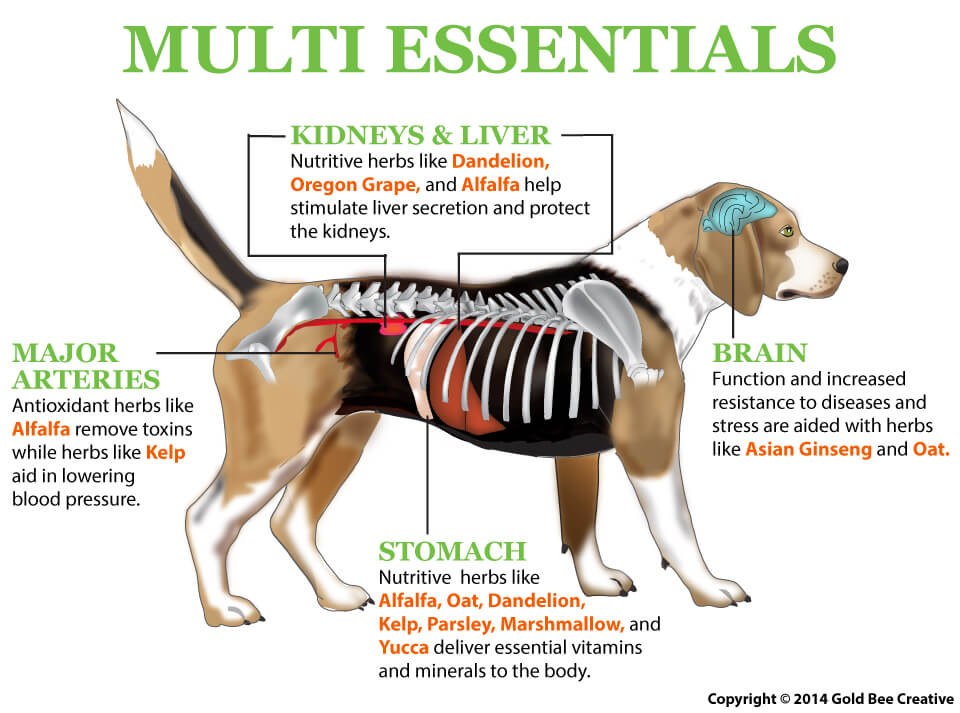
Select your pet's weight to determine the correct dose.
To be taken twice daily. Determine your pet’s weight and then use the easy chart below to determine the correct dose. This is the minimum dosage.
Pet's Weight Dosage
0 - 15 lb = 0.5 ml
16 - 30 lb = 1.0 ml
31 - 45 lb = 1.5 ml
46 - 60 lb = 2.0 ml
61 - 75 lb = 2.5 ml
Over 75 lb = 3.0 ml
How to Administer
Shake well before use. The easiest method is to use the dropper provide and places the drops into your pet’s food or favorite treat. You can also use the dropper and squirt directly into the pet’s mouth.
Some pets can be finicky, if this occurs consider hiding the drops in foods most pet’s love such as fish, chicken or yogurt or a favourite treat. If your pet only eats dry food then soak a few kibbles at feeding time.
For Best Results
Herbal dietary supplements are beneficial to the health and wellbeing of your pet and are safe for long-term use. Every pet responds to natural herbal supplements differently, therefore it is important to be consistent and administer the product daily. Supplements generally take two to four weeks to take effect, however this will vary from one animal to the next.
Product Storage
All NHV Natural Pet Products are pure herbal extracts and contain no artificial additives, preservatives or coloring. Shelf life after opening is 6 months and must be refrigerated after opening.
Cautions and Contraindications
Do not use Multi Essentials in pregnant or nursing animals. Speak to your vet before using our products. A second visit is recommended if your pet’s condition does not improve, or deteriorates after continued use of the supplements.
All information provided by NHV Natural Pet Products is for educational purposes only.
Millions of people take multivitamins daily to support their health, and it only makes sense our canine companions can benefit just as much. This 100% natural plant-based liquid blend can help your dog with nutritional deficiencies.
Signs of Possible Vitamin Deficiency in Dogs
NHV’s Multi-Essentials are packed with herbs that are rich in vitamins and minerals. This vet-formulated blend is designed to benefit your dog’s health using all-natural organically grown herbs with no additives or preservatives.
Even if your pet is healthy, supplying a multivitamin is essential to maintain good health, and some pets need more vitamins and minerals than others. For more, read NHV’s blog, vet talk with Dr. Hillary Cook.
Benefits of NHV’s Multivitamins for Dogs
You can read NHV's blog about the importance of dog vitamin supplements. All pets can benefit from NHV’s Natural Pet Product, even small exotic pets.
If you have questions about plant-based supplements including our multivitamins for dogs, you can schedule a consultation with one of our highly trained holistic veterinarians, because, at NHV, total health and wellness for all pets is our top priority.

Select your pet's weight to determine the correct dose.
To be taken twice daily. Determine your pet’s weight and then use the easy chart below to determine the correct dose. This is the minimum dosage.
Pet's Weight Dosage
0 - 15 lb = 0.5 ml
16 - 30 lb = 1.0 ml
31 - 45 lb = 1.5 ml
46 - 60 lb = 2.0 ml
61 - 75 lb = 2.5 ml
Over 75 lb = 3.0 ml
How to Administer
Shake well before use. The easiest method is to use the dropper provide and places the drops into your pet’s food or favorite treat. You can also use the dropper and squirt directly into the pet’s mouth.
Some pets can be finicky, if this occurs consider hiding the drops in foods most pet’s love such as fish, chicken or yogurt or a favourite treat. If your pet only eats dry food then soak a few kibbles at feeding time.
For Best Results
Herbal dietary supplements are beneficial to the health and wellbeing of your pet and are safe for long-term use. Every pet responds to natural herbal supplements differently, therefore it is important to be consistent and administer the product daily. Supplements generally take two to four weeks to take effect, however this will vary from one animal to the next.
Product Storage
All NHV Natural Pet Products are pure herbal extracts and contain no artificial additives, preservatives or coloring. Shelf life after opening is 6 months and must be refrigerated after opening.
Cautions and Contraindications
Do not use Multi Essentials in pregnant or nursing animals. Speak to your vet before using our products. A second visit is recommended if your pet’s condition does not improve, or deteriorates after continued use of the supplements.
All information provided by NHV Natural Pet Products is for educational purposes only.
Pet Nutrition
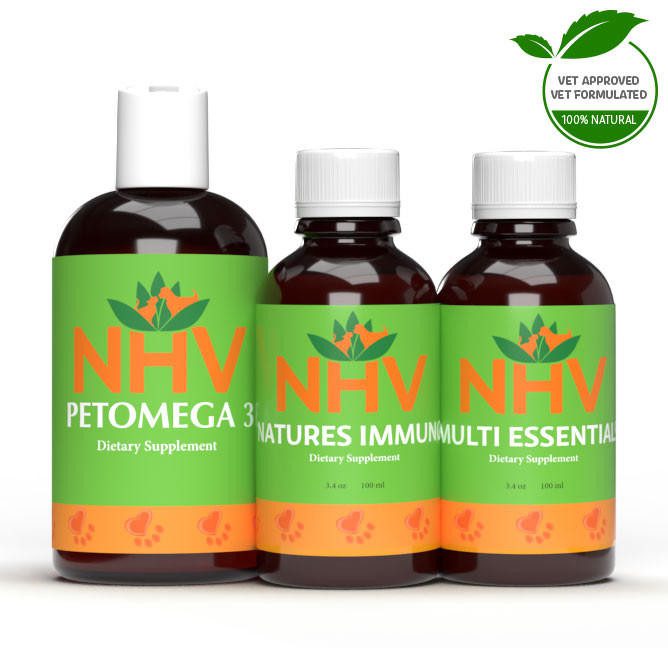
Natural Pet Nutrition Supplements for Cats and Dogs
bundle and save with pet expert kits
3 month supply for a small to medium size pet
As pet parents, we all want our little ones to live a long and healthy life. To help your cat or dog age gracefully, our pet nutrition products are formulated to fill nutritional voids, soothe inflammation and offer a beneficial aid for rebalancing immune health.

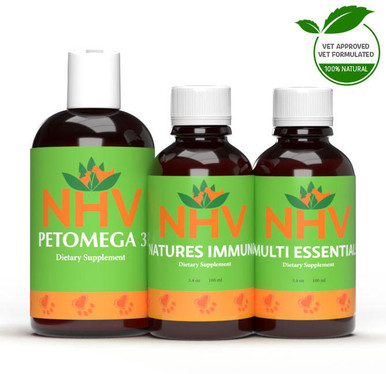
As pet parents, we all want our little ones to live a long and healthy life. To help your cat or dog age gracefully, our pet nutrition products are formulated to fill nutritional voids, soothe inflammation and offer a beneficial aid for rebalancing immune health.

All pet pawrents want their furkiddos to live a long and healthy life. Good health begins with adequate nutrition. So for all those pets out there who want a little nutritional support or may be battling a serious illness, Our Pet Nutrition Supplement Bundle offers comprehensive support for many body processes, including rebalancing immune health and relieving inflammation. All of our supplements are made with full-spectrum plant extracts that are formulated specifically for pets. Full-spectrum means that all of the vitamins, minerals and trace elements are kept intact during the extraction process to make it absorbable for your little one's body.
NHV Multi Essentials is full of vitamins and minerals to help improve digestion and absorption and fill nutritional voids due to poor diet or illness. The omega 3 fatty acids in PetOmega 3 work to relieve inflammation in the GI tract, promote healthy digestion and balance appetite. Natures Immuno's mushroom blend is formulated with anti-inflammatory properties that gently rebalance the immune system (without overstimulating it) and offers cardiovascular, liver, kidney, diabetic, and endocrine health support.
MULTI ESSENTIALS
PETOMEGA 3
NATURES IMMUNO
Help your Pet Live Their Best Life With NHV Supplements
For optimal health, it’s a great idea to supplement your furkiddo’s daily meals with nutrients and immune-boosting ingredients. All of our products are 100% natural and their liquid formulation makes it easy to hide in food. If you need an extra hand (or paw) to improve your pet’s health, get in touch with one of our in-house pet experts. We’re always happy to help!
Made with the finest, organically grown, or ethically harvested herbs. Made specifically for pets, vet-formulated and vet approved.
Multi Essentials
PetOmega 3
Natures Immuno
Select your pet's weight to determine the correct dose.
PETOMEGA 3 : Pet’s Weight Dosage to be taken once a day.
0-15 lb = ¼ tsp
15-30 lb = ½ tsp
30-60 lb = 1 tsp
60-90 lb = 1 ½ tsp
MULTI ESSENTIALS, NATURES IMMUNO : To be taken twice daily. Determine your pet’s weight and then use the easy chart below to determine the correct dose. This is the minimum dosage.
Pet's Weight Dosage
0 - 15 lb = 0.5 ml
16 - 30 lb = 1.0 ml
31 - 45 lb = 1.5 ml
46 - 60 lb = 2.0 ml
61 - 75 lb = 2.5 ml
Over 75 lb = 3.0 ml
How to Administer
Shake well before use. The easiest method is to use the dropper provided and place the drops into your pet’s food or favorite treat. You can also use the dropper and squirt directly into the pet’s mouth. Some pets can be finicky, if this occurs consider hiding the drops in foods most pet’s love such as fish, chicken or yogurt or a favorite treat. If your pet only eats dry food then soak a few kibbles at feeding time.
For Best Results
Herbal dietary supplements are beneficial to the health and well-being of your pet and are safe for long-term use. Every pet responds to natural herbal supplements differently, therefore it is important to be consistent and administer the product daily. Supplements generally take two to four weeks to take effect, however this will vary from one animal to the next.
Product Storage
All NHV Natural Pet Products are pure herbal extracts and contain no artificial additives, preservatives or coloring. Shelf life after opening is 6 months and must be refrigerated after opening.
Cautions and Contraindications
Do not use in pregnant or nursing animals.
All information provided by NHV Natural Pet Products is for educational purposes only.
All information provided by NHV Natural Pet Products is for educational purposes only.
All pet pawrents want their furkiddos to live a long and healthy life. Good health begins with adequate nutrition. So for all those pets out there who want a little nutritional support or may be battling a serious illness, Our Pet Nutrition Supplement Bundle offers comprehensive support for many body processes, including rebalancing immune health and relieving inflammation. All of our supplements are made with full-spectrum plant extracts that are formulated specifically for pets. Full-spectrum means that all of the vitamins, minerals and trace elements are kept intact during the extraction process to make it absorbable for your little one's body.
NHV Multi Essentials is full of vitamins and minerals to help improve digestion and absorption and fill nutritional voids due to poor diet or illness. The omega 3 fatty acids in PetOmega 3 work to relieve inflammation in the GI tract, promote healthy digestion and balance appetite. Natures Immuno's mushroom blend is formulated with anti-inflammatory properties that gently rebalance the immune system (without overstimulating it) and offers cardiovascular, liver, kidney, diabetic, and endocrine health support.
MULTI ESSENTIALS
PETOMEGA 3
NATURES IMMUNO
Help your Pet Live Their Best Life With NHV Supplements
For optimal health, it’s a great idea to supplement your furkiddo’s daily meals with nutrients and immune-boosting ingredients. All of our products are 100% natural and their liquid formulation makes it easy to hide in food. If you need an extra hand (or paw) to improve your pet’s health, get in touch with one of our in-house pet experts. We’re always happy to help!
Made with the finest, organically grown, or ethically harvested herbs. Made specifically for pets, vet-formulated and vet approved.
Multi Essentials
PetOmega 3
Natures Immuno
Select your pet's weight to determine the correct dose.
PETOMEGA 3 : Pet’s Weight Dosage to be taken once a day.
0-15 lb = ¼ tsp
15-30 lb = ½ tsp
30-60 lb = 1 tsp
60-90 lb = 1 ½ tsp
MULTI ESSENTIALS, NATURES IMMUNO : To be taken twice daily. Determine your pet’s weight and then use the easy chart below to determine the correct dose. This is the minimum dosage.
Pet's Weight Dosage
0 - 15 lb = 0.5 ml
16 - 30 lb = 1.0 ml
31 - 45 lb = 1.5 ml
46 - 60 lb = 2.0 ml
61 - 75 lb = 2.5 ml
Over 75 lb = 3.0 ml
How to Administer
Shake well before use. The easiest method is to use the dropper provided and place the drops into your pet’s food or favorite treat. You can also use the dropper and squirt directly into the pet’s mouth. Some pets can be finicky, if this occurs consider hiding the drops in foods most pet’s love such as fish, chicken or yogurt or a favorite treat. If your pet only eats dry food then soak a few kibbles at feeding time.
For Best Results
Herbal dietary supplements are beneficial to the health and well-being of your pet and are safe for long-term use. Every pet responds to natural herbal supplements differently, therefore it is important to be consistent and administer the product daily. Supplements generally take two to four weeks to take effect, however this will vary from one animal to the next.
Product Storage
All NHV Natural Pet Products are pure herbal extracts and contain no artificial additives, preservatives or coloring. Shelf life after opening is 6 months and must be refrigerated after opening.
Cautions and Contraindications
Do not use in pregnant or nursing animals.
All information provided by NHV Natural Pet Products is for educational purposes only.
All information provided by NHV Natural Pet Products is for educational purposes only.
overall vitality
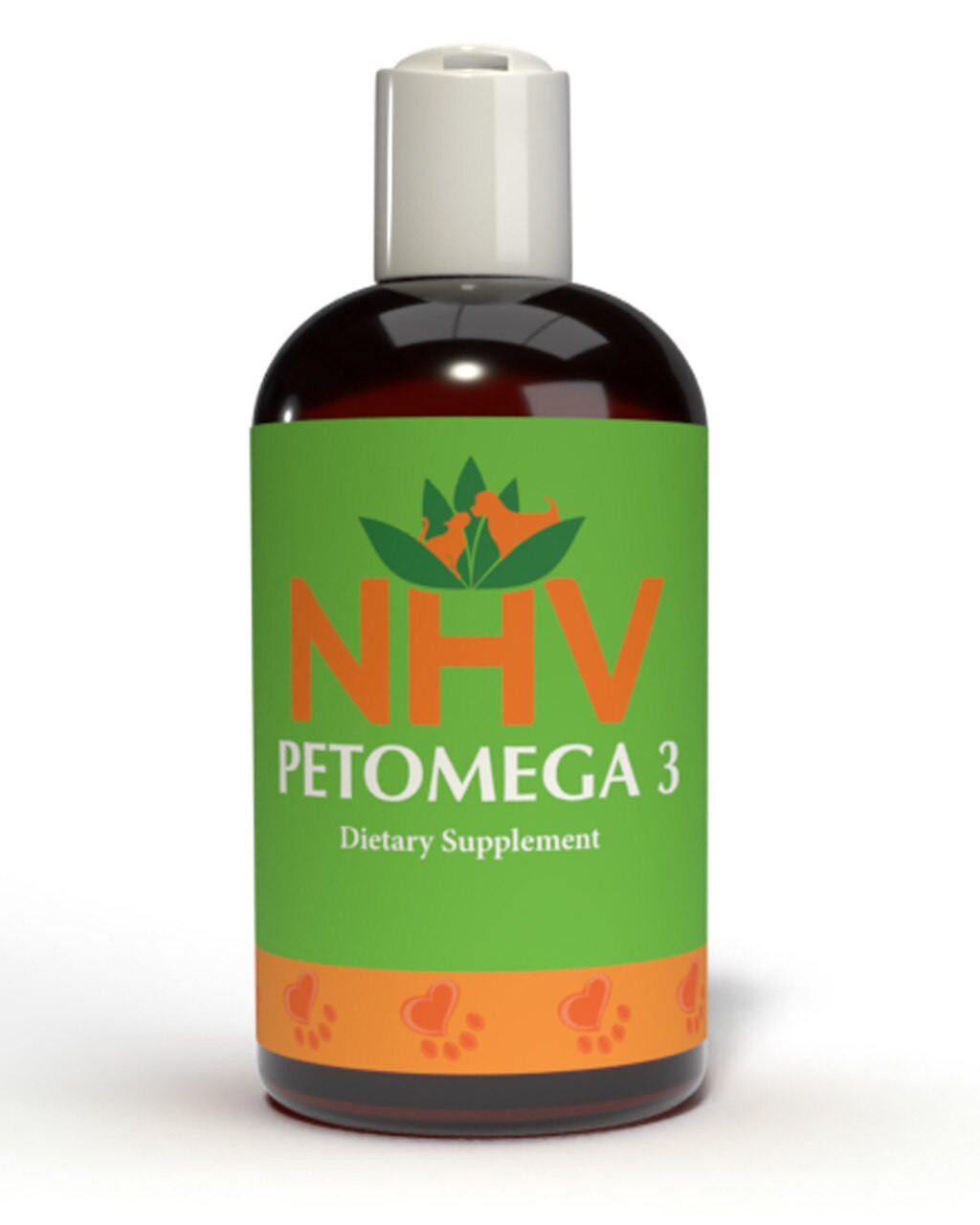
For Overall Health and Well-Being
buy 2 and save $3
Support your dog’s health with omega 3 fish oil for dogs. Help them maintain a healthy coat, eyes, joints, immune system and overall organ function.


Support your dog’s health with omega 3 fish oil for dogs. Help them maintain a healthy coat, eyes, joints, immune system and overall organ function.

Our omega 3 fish oil for dogs is a great source of EPA (Eicosapentaenoic Acid 600mg) and DHA (Docosahexaenoic acid 460mg) essential fatty acids. This fish oil supplement for dogs is derived from sardines, anchovies and North Atlantic cod liver oil. It is molecularly distilled and cold pressed to improve the bioavailability of the omega 3 fatty acids, and is medical and human grade quality.
Omega 3 fish oil for dogs may be beneficial for the following:
Processed pet foods have increased omega-6 fatty acids, and decreased omega-3 fatty acids. The University of Maryland Medical Center states, "It is very important to maintain a balance between omega-3 and omega-6 fatty acids in the diet. A proper balance helps maintain and even improve health." Your dog’s body cannot easily make essential fatty acids. It is vital to provide omega 3 fish oil for dogs as an added supplement to your pet’s daily diet.
The American Journal of Veterinary Medicine has published studies on the benefits of omega 3 fatty acids (fish oils) for arthritis and degenerative joint disease in dogs. The studies showed that dogs who were given omega 3 fatty acids had a significantly improved ability to get up from a resting position and marked improvement in walking ability.
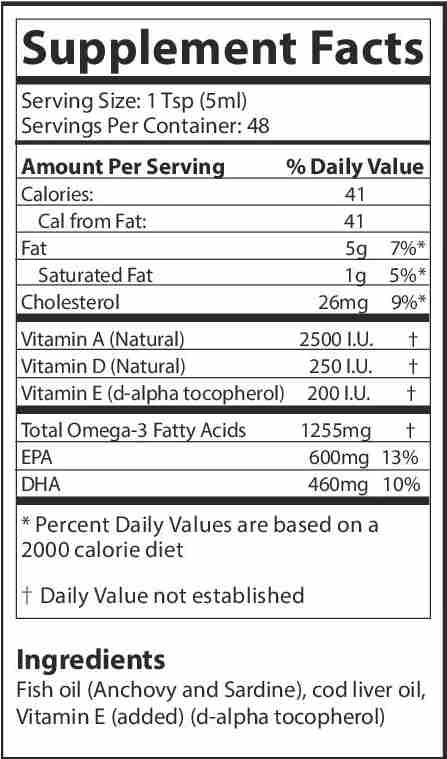
Suggested Dosage: To be taken once per day. Add to food based on weight chart.
Therapeutic Dosage: Double the quantity for maximum period of 4 weeks or follow veterinarian advise.
Pet’s Weight Dosage
0-15 lb = ¼ tsp
15-30 lb = ½ tsp
30-60 lb = 1 tsp
60-90 lb = 1 ½ tsp
How to Administer: Shake well before use. The easiest method is to add the dosage to your pets food. Some pets can be finicky, if this occurs consider hiding the appropriate amount in food most pet’s love such as fish, chicken, yogurt, or a favorite treat. If your pet only eats dry food then soak kibbles at feeding time.
For Best Results
Dietary supplements are beneficial to the health and well-being of your pet and are safe for long-term use. Every pet responds to natural supplements differently, therefore it is important to be consistent and administer the product daily. Supplements generally take two to four weeks to take effect, however this will vary from one animal to the next.
Product Storage
All NHV Natural Pet Products contain no artificial additives, preservatives or coloring. Shelf life after opening is 6 months and must be refrigerated after opening.
Cautions and Contraindications
Avoid During Pregnancy.
Our omega 3 fish oil for dogs is a great source of EPA (Eicosapentaenoic Acid 600mg) and DHA (Docosahexaenoic acid 460mg) essential fatty acids. This fish oil supplement for dogs is derived from sardines, anchovies and North Atlantic cod liver oil. It is molecularly distilled and cold pressed to improve the bioavailability of the omega 3 fatty acids, and is medical and human grade quality.
Omega 3 fish oil for dogs may be beneficial for the following:
Processed pet foods have increased omega-6 fatty acids, and decreased omega-3 fatty acids. The University of Maryland Medical Center states, "It is very important to maintain a balance between omega-3 and omega-6 fatty acids in the diet. A proper balance helps maintain and even improve health." Your dog’s body cannot easily make essential fatty acids. It is vital to provide omega 3 fish oil for dogs as an added supplement to your pet’s daily diet.
The American Journal of Veterinary Medicine has published studies on the benefits of omega 3 fatty acids (fish oils) for arthritis and degenerative joint disease in dogs. The studies showed that dogs who were given omega 3 fatty acids had a significantly improved ability to get up from a resting position and marked improvement in walking ability.

Suggested Dosage: To be taken once per day. Add to food based on weight chart.
Therapeutic Dosage: Double the quantity for maximum period of 4 weeks or follow veterinarian advise.
Pet’s Weight Dosage
0-15 lb = ¼ tsp
15-30 lb = ½ tsp
30-60 lb = 1 tsp
60-90 lb = 1 ½ tsp
How to Administer: Shake well before use. The easiest method is to add the dosage to your pets food. Some pets can be finicky, if this occurs consider hiding the appropriate amount in food most pet’s love such as fish, chicken, yogurt, or a favorite treat. If your pet only eats dry food then soak kibbles at feeding time.
For Best Results
Dietary supplements are beneficial to the health and well-being of your pet and are safe for long-term use. Every pet responds to natural supplements differently, therefore it is important to be consistent and administer the product daily. Supplements generally take two to four weeks to take effect, however this will vary from one animal to the next.
Product Storage
All NHV Natural Pet Products contain no artificial additives, preservatives or coloring. Shelf life after opening is 6 months and must be refrigerated after opening.
Cautions and Contraindications
Avoid During Pregnancy.
Published: November 8, 2022